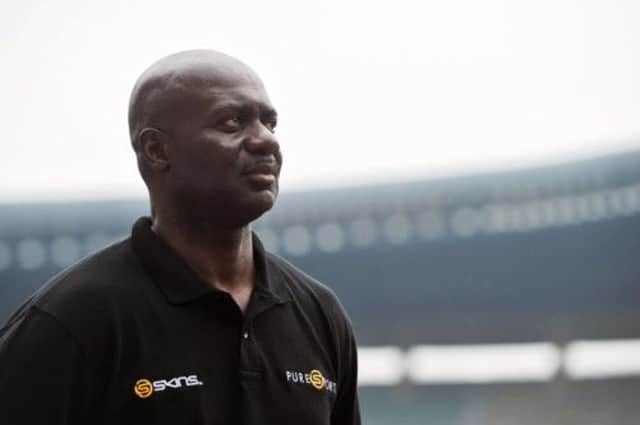Ben Johnson returns to Seoul twenty-five years on


Few athletes evoke the same depth of disdain as Johnson, the Canadian sprinter whose steroid-fuelled surge to gold at the 1988 Seoul Olympics opened the world’s eyes to the menace of doping.
Twenty-five years to the day since he blasted down lane six of Seoul’s Olympic Stadium, leaving arch-enemy Carl Lewis wide-eyed in his wake, Johnson returned to the South Korean capital yesterday with a warning for the next generation of athletes: stay clear of performance-enhancing drugs.
Advertisement
Hide AdAdvertisement
Hide AdNow 51 and, he says, “older and wiser”, Johnson said no mother should have to watch her son or daughter experience what he has lived through for the last 25 years.
“I broke the rules and I got punished. Twenty-five years later I’m still being punished for something I did,” he said. “There’s people who murder and rape people, go to jail and get out. I just break the rules in sport and I’ve been nailed to the cross.”
Johnson was indeed crucified by the media. After hailing him “Bentastic” following the scintillating victory, the media hounded Johnson out of Seoul, labelling him a “disgrace” and “Canada’s shame”. Award-winning Canadian journalist Earl McRae wrote in a searing column for the Ottawa Citizen: “Thanks Ben, you bastard.”
On the final leg of a campaign that calls for radical improvement of the anti-doping system, Johnson talked of a “second chance at life”, of moving on, of a future helping young athletes to “choose the right track”.
At exactly 1:30pm local time, the time that the 1988 race started, a video of the final was shown on the stadium’s big screen. Johnson wore a hint of a smile as he watched his younger self tear down the track.
He is a smaller man now. The massive shoulders that just squeezed into lane six 25 years ago have shrunk. He has a fuller face but with the same unmistakable eyes; eyes that barely blinked in the most controversial 9.79 seconds in the history of sport.
The then world record, which was erased after he tested positive for the steroid stanozolol, is what Johnson remembers most about the race.
“9.79. That’s what everyone was going crazy about,” he said yesterday. “9.79.” Johnson said he was running so fast at that time that he would have won Olympic gold without doping. “I would have still won that race without drugs in 1988. We knew six weeks out that we were capable of 9.72, 9.70.”
Advertisement
Hide AdAdvertisement
Hide AdSo why not race clean? “It just didn’t happen that way. I didn’t go down the path of staying clean. That was my destiny.
“I didn’t worry about getting caught. I just said ‘when the time comes I’ll deal with it’.”
Johnson was the only one of the eight finalists to test positive in Seoul, though that final has come to be known as the “dirtiest race” in history as only two remained untouched by doping scandals.
The Canadian was banned for two years. He got a second chance at the Olympics in Barcelona in 1992, but went out in the semi-finals. Five months later, he was banned again, this time for life, when he tested positive for excessive levels of testosterone.
Out on the track, Johnson watches footage from the anti-doping tour stops in Tokyo, London and New York. A petition of more than 3,700 names calling for the eradication of doping is unfurled down lane six as Johnson walks slowly down the track, stopping to inspect the names.
Milan Novak, Czech Republic.
Chris Sharp, New Zealand.
Bernard Brogan, Ireland.
Vida Sismundo, India.
“A lot of names, man,” he says. “Lots from the United Kingdom. Lots of Bens!”
At the urging of the media Johnson runs the last 30 metres towards the cameras, switching from stationary object to human missile in the blink of an eye. He is still very fast. A born sprinter.
Jaimie Fuller, the Australian businessman whose SKINS sports compression wear company is behind the campaign, summed up why he thinks Johnson has been vilified for so long. “There’s no bigger stage than the Olympic Games and there is no bigger event at the Olympics than the 100 metres final,” he said. “It was a seminal moment in the history of sport.”
Advertisement
Hide AdAdvertisement
Hide AdA cast of Johnson’s right foot is taken, to be put on display at the Olympic Stadium.
“Ugly feet,” quips Fuller.
“Fast feet,” replies Johnson.
The Canadian hopes the next generation of sprinters do not follow in his footsteps.
“I have a new chance at life and I’m moving forward,” he said. “Ben Johnson is on a different path, of choosing the right track. Send a message to the young generation: ‘Don’t cheat, don’t take drugs in sport.’ That’s the message.”